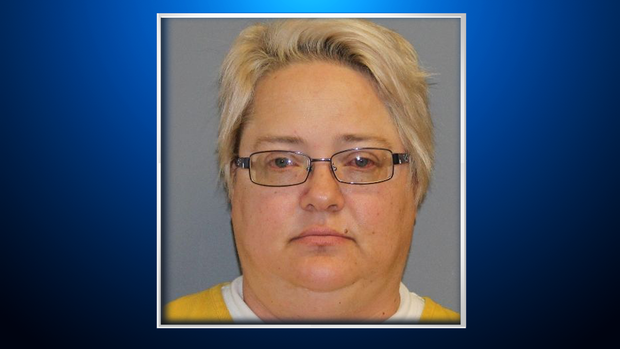A former elections manager who prosecutors say assisted in a security breach of voting equipment in a Colorado county pleaded guilty on Wednesday under a plea agreement that requires her to testify against her former boss.
Sandra Brown is one of two employees accused of helping Mesa County Clerk Tina Peters allow a copy of a hard drive to be made during an update of election equipment last year in search of proof of the false conspiracy theories spun by former President Donald Trump.
Brown, 45, pleaded guilty to attempting to influence a public servant, a felony, and official misconduct, a misdemeanor, but will not be sentenced until right after she testifies at Peters’ trial next year so her performance on the witness stand can be considered.
“There were things going on that I should have questioned and I didn’t,” Brown told Judge Matthew Barrett.
Mesa County Sheriff’s Office
In August, Peters’ chief deputy, Belinda Knisley, also pleaded guilty under a deal that required her to testify against Peters. She only pleaded guilty to misdemeanor counts and was immediately sentenced to two years of unsupervised probation.
Peters gained national prominence by promoting conspiracy theories about voting machines and lost a bid to become the Republican candidate for Colorado’s secretary of state, who oversees elections, earlier this year. She is charged with three counts of attempting to influence a public servant, criminal impersonation, two counts of conspiracy to commit criminal impersonation, one count of identity theft, first-degree official misconduct, violation of duty and failing to comply with the secretary of state.
She has dismissed the allegations, calling them politically motivated, and has pleaded not guilty.
According to Brown’s arrest affidavit, Knisley worked to get a security badge for a man Peters said she was hiring in the clerk’s office. Peters then used it to allow another, unauthorized person inside the room to make a copy of the election equipment hard drive during the May 2021 election equipment update, it said. Brown was present when the copy was made and conspired to misrepresent the identity of the person using the badge, it said.
Brown contacted the secretary of state’s office asking for permission for an administrative assistant to be allowed to attend the update but knew that person was really a computer expert who would not have been allowed to attend, District Attorney Dan Rubinstein told Judge Matthew Barrett during Brown’s plea hearing. The credential for that expert was then used by another person to get in the room and make a copy of the hard drive, he said. That person has not been charged.
“She knew she was setting up a sham,” Rubinstein said of Brown.
Thomas Peipert/AP
State election officials became aware of the security breach when a photo and video of confidential voting system passwords were posted on social media and a conservative website.
Brown’s deal, which Barrett will not decide whether to accept until sentencing, would allow her to serve up to 30 days in jail for the misdemeanor. It would allow the felony conviction to be erased after two years if she complies with conditions he sets, such as requiring community service, for those two years. If Barrett rejects the plea deal, Brown could withdraw her guilty pleas.

